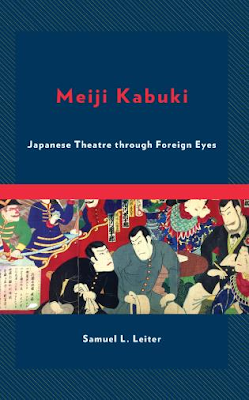Dear Readers: Here's wishing you a happy holiday season and New Year. Just about a year ago, I published my 30th book, Meiji Kabuki: Japanese Theatre through Foreign Eyes. Now, on January 5, my latest book, Brooklyn Takes the Stage: Nineteenth-Century Theater in the City of Churches, is going to be published. For those who may be interested, here's the info.
MEIJI KABUKI: JAPANESE THEATRE THROUGH FOREIGN EYES (Lexington Books/Rowman and Littlefield)
A 2023 Choice Reviews Outstanding Academic Title
This book is an annotated collection of English-language documents by foreigners writing about Japan’s kabuki theatre in the half-century after the country was opened to the West in 1853. Using memoirs, travelogues, diaries, letters, and reference books, it contains all significant writing about kabuki by foreigners—resident or transient—during the Meiji period (1868–1912), well before the first substantial non-Japanese book on the subject was published. Its chronologically organized chapters contain detailed introductions. Twenty-seven authors, represented by edited versions of their essays, are supplemented by detailed summaries of thirty-five others. The author provides insights into how Western visitors—missionaries, scholars, diplomats, military officers, adventurers, globetrotters, and even a precocious teenage girl—responded to a world-class theatre that, apart from a tiny number of pre-Meiji encounters, had been hidden from the world at large for over two centuries. It reveals prejudices and misunderstandings, but also demonstrates the power of great theatre to bring together people of differing cultural backgrounds despite the barriers of language, artistic convention, and the very practice of theatergoing. And, in Ichikawa Danjuro IX, it presents an actor knowledgeable foreigners considered one of the finest in the world. (Hardbound $125)
BROOKLYN TAKES THE STAGE: NINETEENTH-CENTURY THEATER IN THE CITY OF CHURCHES
America’s third largest city until 1890, Brooklyn, New York, had a
striking theatrical culture before it became a borough of Greater New York in
1898. As the city gained size and influence, more and more theatres arose, with
at least 15 venues ultimately vying for favor. Too many theatregoers, however,
preferred the discomforts of a ferry and horsecar trip to New York’s playhouses
instead of supporting the local product. Nor did the completion of the Brooklyn
Bridge in 1883 do Brooklyn’s theatres any favors. Manhattan’s Goliath slayed
Brooklyn’s David.
This first comprehensive study of Brooklyn’s old-time theatre describes the
city’s early history, each of its many playhouses, its plays and actors
(including nearly every foreign and domestic star), and its scandals and
catastrophes, including the theatre fire that killed nearly 300. Brooklyn’s ongoing struggle to establish theatres in a society dominated by
anti-theatrical preachers, including Henry Ward Beecher, is detailed, as are
all the ways that Brooklyn typified 19th century American theatre, from stock
companies to combinations. Replete with fascinating anecdotes, this is the
story of a major city from which theatre all but vanished before being reborn
as a present-day artistic mecca. (Paper: $59.95)

